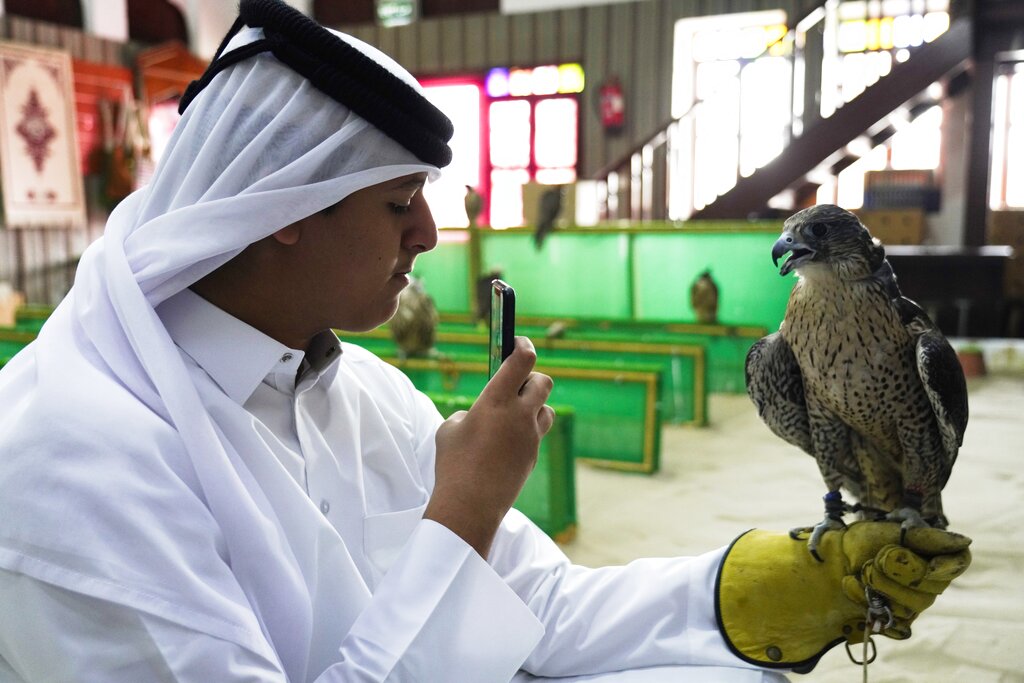FIFAワールドカップ2022の開催権を獲得して以来、カタールは世間の注目を集めている。だが、首都ドーハの由緒ある中心街にはほかにも盛況なスポーツがあり、100万人を超えるファンが外国からこの小さな首長国にやって来る。目的は鷹狩りだ。
ドーハで100年の歴史を持つ迷路のような市場「スーク・ワキフ」では、スパイスや土産物を売る店のほか、ベドウィン族(アラブの遊牧民族)の間で昔から情熱が注がれてきた有名なハヤブサを集めた店、さらには最新鋭の動物病院など、さまざまな施設が軒を連ねている。

カタールのドーハにある店でハヤブサを見るカタール アブドゥルアジズ アランシ (16 歳) AP Photo/Jon Gambrell
アラブ人は何世紀にもわたってハヤブサを使って狩りをしたり、その美徳を讃える詩を詠んだりしてきた。高層ビルが立ち並ぶ豊かな街として、世界最大のスポーツイベントが開催されている現在も、ハヤブサはカタールの文化と伝統を強く想い起こさせる存在となっている。
「もちろん、サッカーはスポーツの母のようなものだ。だがカタールには、サッカー以外にも海外の人たちに知ってもらいたい重要なスポーツがある」と、シリアの田舎町に生まれ、20年以上も前に家族でドーハに移住してハヤブサの飼育を始めたハリド・アル・カジャ(45)は話している。「ハヤブサとの付き合いは、砂漠や自然と人間との関係を物語っている。生活の原点に私たちを立ち返らせてくれる」とも語っている。
ワールドカップ開会式前日、世界から興奮状態にあるファンがスーク・ワキフに押し寄せ、肌を突き刺すような秋の日差しをものともせず香水やお香の屋台をさまよい、鳴き騒ぐオウムやボタンインコの様子を眺めていた。
ワールドカップという注目を集めるイベントの開催により、「人生を捧げてきた伝統ある楽しみに対する世界の評価が高まってくれるとありがたい」とアルカジャは暗い路地で語った。止まり木の上では、何列にもなって並ぶハヤブサが鑑定を受けようとしていた。カタールの人々からすると、ハヤブサは愛情を注ぐペットであり、ステータスシンボルであるほか獰猛なハンターでもある。
エネルギー大国のカタールがワールドカップ開催に向け2000億ドル(約27.8兆円)を投資し、空調完備の広大なスタジアム、お洒落なホテル、さらにはファンが市内で移動するのに使う地下鉄を建設していることに触れつつ、「ここには最新のインフラ、建物など何でもある」とアルカジャは話す。歴史あるスーク・ワキフのすぐ北側には、ウェスト・ベイの高層ビル群がまばゆいほどに輝いている。
「だけど過去を忘れてはいけない。鷹狩りには、地域をひとつにまとめる情熱がある」とも話す。
鷹狩りの人気が近年急上昇しているのは、この国が首長国として成立する前、ましてや豊富な天然ガスを産出しグローバルビジネスの拠点となる前の時代から存在していた文化に、国民や長年アラブに住む人々が価値を見出すようになったからだという。
カタールやアラビア半島の砂漠地帯ではハヤブサの愛好会が発足し、ハヤブサの美やスピードを競うイベントも行われるようになり、鳥の価格が高騰していると取引業者は話す。アルカジャの店で最も高価なハヤブサは100万カタールリヤル(約3800万円)もの値がついている。

カタールのドーハにある店舗で売りに出されているハヤブサ。頭巾を被っている AP Photo/Jon Gambrell
ドーハ近くにあるスーク・ワキーフ・ファルコン病院ほど、ハヤブサに対する愛情が溢れている場所はない。この施設全体がハヤブサの専門的な治療とケアに特化しており、専門の医師がハヤブサの骨折を治療し、極端に長い爪をやすりで削り、X線の検査を行う。
だが、ハヤブサに熱をあげる人たちのところにも、アラブ地域で初めて開催されるワールドカップの興奮が押し寄せようとしている。カタールで鷹匠をしているマスナド・アリ・アル・モハナディは、サッカーの試合の勝敗を占うことができる霊能力があるとして愛鳥のネイヤーを宣伝に使っている。

AP Photo/Jon Gambrell
ドーハの北50キロにあるアル・コールで、モハナディは11月20日の試合(*)の対戦相手であるカタールとエクアドルの国旗にハヤブサの餌となる鳩の肉をくくりつけた。2機のドローンが旗ごと上空に引き上げた。ドローンが上空で漂う中、パイロット用サングラスをかけアラブの伝統的な白い服を身にまとったアル・モハナディは、試合に勝つ国を選ぶようハヤブサにけしかけた。
澄み切った砂漠の大気に鳥を解き放ち、「カタールの方に行け!」と叫んだ。ネイヤーはカタールの国旗に向かって飛び立った。ところがすぐさま方向を変え、エクアドルの国旗色に包まれた餌を襲ったのだった。
「エクアドルに行ったか」……失望の表情を浮かべつつ、アル・モハナディは「でもどうか、カタールが勝ちますように」と話していた。
(*)11月20日の対戦でカタールは0対2でエクアドルに敗れた。
By ISABEL DEBRE Associated Press
DOHA, Qatar (AP)
Qatar has become a focal point for soccer since winning the right to host the World Cup. But another sport is flying high in the historic center of the capital, Doha, as over a million foreign fans flock to the tiny emirate: Falconry.
At the bustling Souq Waqif, a 100-year-old labyrinth marketplace in Doha, shops selling spices and souvenirs give way to stores — and even a state-of-the-art hospital — filled with the famed birds that have long inspired passion among Bedouin tribes.
For centuries, Arabs across the region have used falcons to hunt and recited poems extolling their virtues. Today, the birds of prey serve as potent reminders of Qatari culture and tradition even as the skyscraper-studded city races to ready itself for the world’s biggest sporting event.
“Of course, football is the mother of sports. But alongside football there are other, very important sports that we want foreigners to understand about Qatar,” said Khalid al-Kaja, a 45-year-old falconer originally from the Syrian countryside who moved to Doha with his family over two decades ago to breed the bird. “The way that we deal with falcons says so much about our relationship with the desert, with nature. It brings us back to the basics of life.”
Excited fans from around the world trickled into Souq Waqif on Saturday, a day before the World Cup opening ceremony, braving Doha’s piercing autumn sun to wander through the stalls of perfume and incense and check the stock of squawking parrots and lovebirds.
In a dark alley, al-Kaja expressed hope that the spotlight of the World Cup would boost global appreciation for the ancient pastime to which he has dedicated his life. Lines of falcons, tethered to perches, waited to be appraised on Saturday. For Qatari customers, the raptors serve as beloved pets, status symbols — and ferocious hunters.
“Qatar has this new infrastructure, the buildings, everything,” al-Kaja said, referring to the $200 billion that the energy-rich country has poured into the soccer tournament, building up vast air-conditioned stadiums, swanky hotels and even a metro system to whisk fans around the city. Just north of the historic Souq Waqif, the skyscrapers of West Bay glittered.
“But we don’t forget the past. Falconry is a passion that brings the whole region together,” al-Kaja said.
In recent years the popularity of falconry has soared, he added, as Qatari citizens and long-time Arab residents see rising value in cultural holdovers from a time before the emirate was even a country, let alone a hub of natural gas wealth and international business.
Falcon clubs, beauty contests and races have sprouted up in the desert of Qatar and across the Arabian Peninsula, causing falcon prices to surge, traders say. The finest in al-Kaja’s store fetch as much as 1 million Qatari riyal ($274,680), he said.
Nowhere is the love of falcons more evident than Doha’s nearby Souq Waqif Falcon Hospital — an entire medical facility devoted to the expert treatment and care of the birds. Surgeons mend broken falcon bones, file their excessively long nails and conduct full-body bird X-rays.
But even among the falcon-crazed, excitement about the World Cup — the first ever in the Arab world — looms large. One Qatari falconer, Masnad Ali Al Mohannadi, advertises his beloved bird, named Neyar, as a psychic capable of choosing World Cup match winners.
Earlier this week in Al Khor, some 50 kilometers (30 miles) north of Doha, he tied pigeon meat to the flags of Qatar and Ecuador — the teams that will kick off the tournament on Sunday. Two drones pulled the flags into the sky. As they fluttered overhead, Al Mohannadi, in his aviator sunglasses and traditional white robe, asked his falcon to choose the winner.
“Go for Qatar, go for Qatar!” he pleaded as he unleashed his bird into the limpid desert air. Neyar rushed toward Qatar’s flag. But a moment later, the raptor plunged in the opposite direction, attacking the meat wrapped in Ecuador’s national colors.
“He chose Ecuador,” said Al Mohannadi. Disappointment flickered across his face. “God willing, Qatar will win.”
By ISABEL DEBRE Associated Press
DOHA, Qatar (AP)
___
Associated Press writers Nebi Qena and Srdjan Nedeljkovic contributed to this report.



